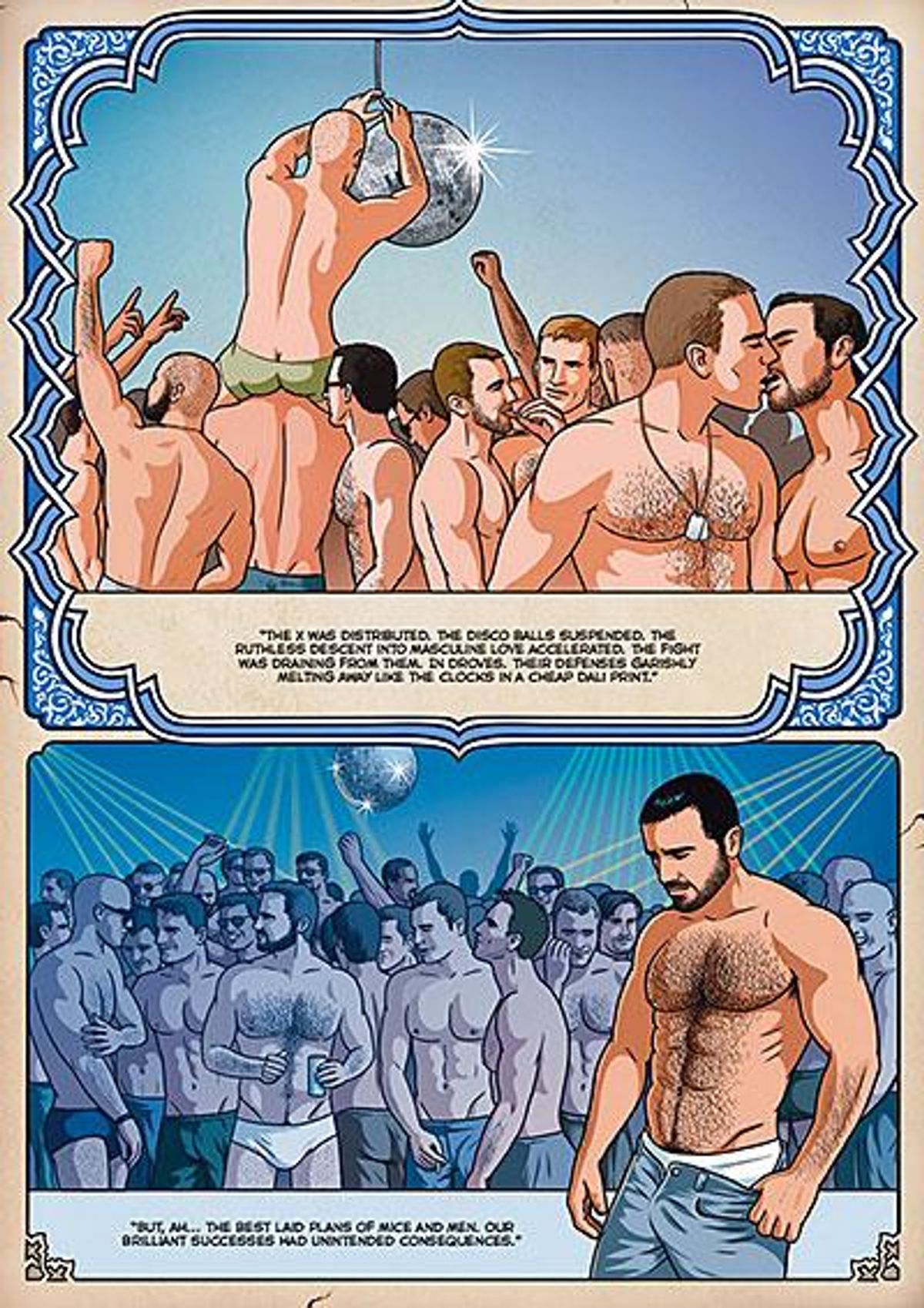Since 2010, the Seattle-based company Northwest Press has been the publisher of record for queer comic books, covering everything from gay superheros and unfabulous social lives to queer noir detectives and bisexuals in love.
Zan Christensen is the Founder and Publisher of Northwest Press. He couldn't have imagined he'd be in such a role back when he was a flamey goth high school student, equal parts Madonna and Bauhaus. Back then, he studied fine arts throughout his education, and rediscovered comic books after graduating from college in the '90s.
There wasn't much in the way of queer content in mainstream graphic novels at the time. If you lived in a major city, you might've been lucky enough to have a weekly gay rag with a recurring strip like Boy Trouble, Curbside, or Dykes to Watch out For. Now and then, a minor gay character might pop up a in popular superhero book, and Zan and his comic-book friends meticulously sought them out. He joined an AOL chat group -- because that's what you did in ancient times -- called Gay League of America where he could debate the relative merits of Mon-El and Timber Wolf, and started volunteering to help what few LGBT creators he could find.
"I'd always thought that I was going to be a freelancer and I was going to write comics. That was my dream," he said. "But as somebody who was getting to know the industry, that lost its luster."
As it turned out, there weren't a lot of opportunities to work on books about gay romance at Marvel and DC.
"I wanted to tell a story that was important to me," he said, "navigating sex and romance, being a queer person in a straight world. ... Being a good person and a moral person while still having to reject what society says is moral or not moral."
To hear queerness described in those terms, it sounds perfectly suited to mainstream superheroics. What could be more Batmanish than maintaining one's own moral code as an outcast?
But the industry wasn't ready for Bruce Wayne to be a friend of Dorothy. So Christensen focused his attention on founding Prism Comics, a nonprofit that provides resources like grants and guidance to queer creators. Prism found a home at Comic-Con between the Marvel and DC booths, where it served as an informal queer meeting point every year.
Eventually a book called Teleny and Camille caught his attention. John Macy had adapted the story from an anonymously-penned 1893 erotic novel, rumored to have been written by Oscar Wilde and some associates.
"That book was so important," Christensen remembered. "It was a window into gay culture at the beginning [of] gay culture. It was unabashedly romantic and sexual."
Macy had been shopping the book around, but wasn't finding any good offers. Zan got ahold of a copy, and instantly knew how he could package the book so the right people would be excited about it. It was the first title Northwest Press produced, along with a comic by Justin Hall with the problematic title of Glamazonia: The Uncanny Super-Tranny.
Glamazonia was a crazy silly superheroine story, plopped into a genre of macho overmuscled men. It might've been a little crazy to start a publishing company with two of the most challenging titles imaginable: a hundred-year-old sex story and a messy trans superheroine. But the bet paid off. Macy's book took home a Lambda Literary award that year. Oscar Wilde would have been proud.
"It was sort of a 'welcome to the book world' award," Christensen said.
That willingness to publish explicit work also means that Christensen and publishers like him are constantly butting heads with gatekeepers who clutch their pearls at sexuality. Several years ago, the Apple store rejected an illustrated adaptation of The Importance of Being Earnest. (The company only relented when naked butts and shirtlessness were covered by black bars.)
Apple initially allowed Teleny and Camille, but objected to Al-Queda's Super Secret Weapon, a goofy sexy parody of the war on terror. There was some obscured nudity, and one section contained a wryly illustrated gay kamasutra, but overall the book wasn't masturbatory (unless jokes about John McCain and Peggy Noonan turn you on).
Frustratingly, Apple initially allowed individual issues of Fearful Hunter but then rejected a collection of the already-published issues. When Christensen pointed out the inconsistency, the individual issues started vanishing from the store.
As a result, Northwest Press has come to rely on more progressive sites for selling content, such as Gumroad. That's where you can find Anything that Loves, an anthology that Christensen is excited about having recently published.
"It feels like a turning point for me and the company," he said.
The book focuses on bisexual characters, and it was the first time Christensen didn't have to agonize over the identity politics of characters. "It was less about identity," he said, "and more about really messy and beautiful complicated sexual romantic histories for people. All the exceptions and all of the rules."
Northwest Press is also branching out into new genres, with books like Dash, written by Dave Ebersole and Dalie Gable. (It's a noir-styled hybrid of The Maltese Falcon and Indiana Jones.) He's also quite proud of Bold Riley, a series that stars a lesbian of color that's been a huge crossover hit.
Christensen plans to keep challenging convention, whether it's by bending genres or bending sexual identities. Forthcoming titles will likely be even more unusual.
But, he adds, "I'll always have a soft spot for Wonder Woman. Who wouldn't?"












































































